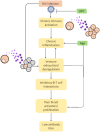Vaccine responses in ageing and chronic viral infection
- PMID: 36845567
- PMCID: PMC9914503
- DOI: 10.1093/oxfimm/iqab007
Vaccine responses in ageing and chronic viral infection
Abstract
Over the last few decades, changing population demographics have shown that there are a growing number of individuals living past the age of 60. With this expanding older population comes an increase in individuals that are more susceptible to chronic illness and disease. An important part of maintaining health in this population is through prophylactic vaccination, however, there is growing evidence that vaccines may be less effective in the elderly. Furthermore, with the success of anti-viral therapies, chronic infections such as HIV are becoming increasingly prevalent in older populations and present a relatively unstudied population with respect to the efficacy of vaccination. Here we will examine the evidence for age-associated reduction in antibody and cellular responsiveness to a variety of common vaccines and investigate the underlying causes attributed to this phenomenon, such as inflammation and senescence. We will also discuss the impact of chronic viral infections on immune responses in both young and elderly patients, particularly those living with HIV, and how this affects vaccinations in these populations.
© The Author(s) 2021. Published by Oxford University Press.
Figures



References
-
- United Nations. World Population Ageing 2019: Highlights.; 2019. Accessed June 26, 2020. https://www.un.org/en/development/desa/population/publications/pdf/agein...
-
- WHO. Ageing and health. Accessed June 26, 2020. https://www.who.int/news-room/fact-sheets/detail/ageing-and-health
-
- Older Adults and COVID-19 | CDC. Accessed August 20, 2020. https://www.cdc.gov/coronavirus/2019-ncov/need-extra-precautions/older-a...
Publication types
Grants and funding
LinkOut - more resources
Full Text Sources
Miscellaneous
